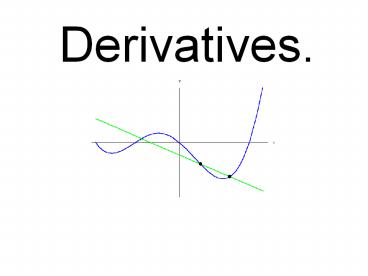An Introduction to Derivatives - PowerPoint PPT Presentation
1 / 19
Title:
An Introduction to Derivatives
Description:
Derivatives. The concept of a Derivative is at the core of Calculus and modern mathematics To derive: to take or get (something) from (something else) Differentiation ... – PowerPoint PPT presentation
Number of Views:699
Avg rating:3.0/5.0
Title: An Introduction to Derivatives
1
Derivatives.
2
- The concept of a Derivative is at the core of
Calculus and modern mathematics
3
- To derive
- to take or get (something) from (something else)
For us, we are going to start with a function,
and we are going to derive another function
4
- Differentiation is one of the most fundamental
and powerful operations in all of calculus.
5
It is a concept that was developed over two
hundred years ago by two people
Sir Issac Netwon (Lagrange Notation)
Gottfried Leibniz (Leibniz Notation)
6
In 2 sentences.
- So far, we have been able to find the
instantaneous rate of change (speed) at any
point.. - The Derivative is a function that will allow us
to calculate the instantaneous rate of change at
every point.
7
The formula for the derivative is created through
the combination of the 2 main concepts we have
studies so far1. The difference quotient2.
Limits
8
- Starting with our difference quotient, we no
longer want to construct a single secant line
starting at a. - We want to construct a secant line anywhere
within the domain. - To do this, we replace a with x
becomes
9
(No Transcript)
10
- Next, we no longer want this to represent a
secant line. - We want a tangent line.
- We want to know the exact slope at each point
x. - To do this, we must make h infinitely small.
- A limit will allow us to reduce h in this manner
11
First Principles Definition of a Derivate The
derivative of a function f(x) is a new function
f(x) defined by
12
Video of the Derivative
13
Find the derivative of f(x) x2(find a function
that represents the slopes of all tangents)
- f(x)
14
1
1
15
Now take the limit substitute h 0 (always
try sub First)
2x
We can now sub in any value of x to determine the
slope of the tangent for every point x in the
domain..
Confirm with DESMOS!!!!!
16
Other notation
- Leibniz notation
- Read as dee y by dee x
- It reminds us of the process by which the
derivative is obtained - D as in delta, as in the change in y with
respect to the change in x
17
Use first principles to differentiate f(x) x3
- f(x)
18
The height of a javelin tossed in the air is
modelled by the function H(t) -4.9t2 10t 1,
where H is the height, and t is time, in seconds.
- Determine the rate of change of the height of the
javelin at time t. - Determine the rate of change of the javelin after
1,2 and 3 seconds.
19
- Pg 58
- 1-17































